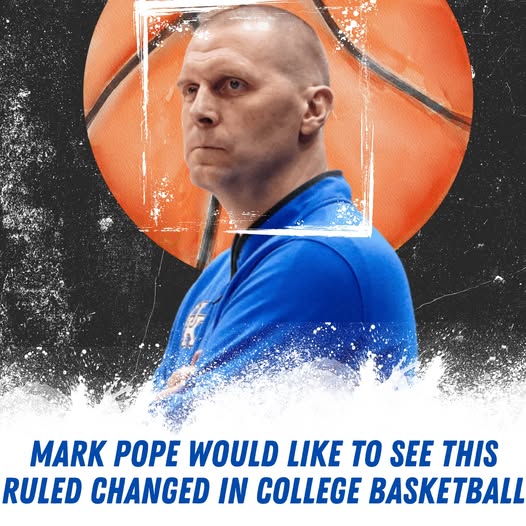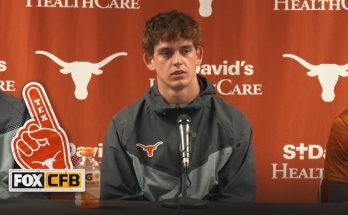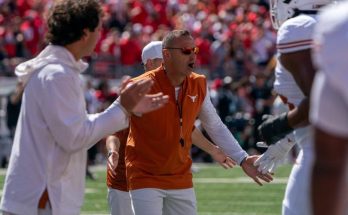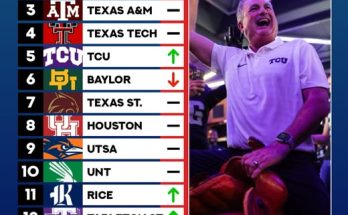Mark Pope isn’t just a head coach—he’s a basketball visionary. As the newly appointed head coach at Kentucky, Pope is bringing more than just energy and charisma to one of the sport’s most storied programs. He’s bringing ideas. Bold ones. Revolutionary ones. And perhaps none more intriguing than his push to change how basketball is played at its most critical junctures—by allowing teams to advance the ball after timeouts, even outside the final two minutes of a game.
To many, this may seem like a minor technical tweak. But to Pope, it’s a window into the future of basketball—one that’s faster, more strategic, and ultimately more exciting for fans and players alike. This vision, rooted in years of coaching, observation, and immersion in the nuances of the game, speaks volumes about Pope’s approach to the sport: innovate, elevate, and never be satisfied with the status quo.
In the current landscape of college basketball, the rulebook doesn’t allow for the ball to be advanced to half-court after a timeout except under very specific conditions, typically within the final two minutes of a game. This restricts strategic flexibility and often results in stagnant, time-wasting possessions. For Pope, it’s a lost opportunity—a limitation that undercuts a team’s ability to capitalize on key possessions and keep the game dynamic.
“I want the game to reflect the intelligence and athleticism of the people playing it,” Pope has said in multiple interviews. “Right now, there are artificial limits that slow the game down and reduce strategic creativity. Why are we keeping the ball in the backcourt after a timeout when we could be setting up a brilliant sideline out-of-bounds play near midcourt?”
It’s a fair question. And when Pope poses it, it’s hard not to rethink what’s possible.
The idea isn’t unprecedented. The WNBA and NBA have long implemented rules that allow for the advancement of the ball to the frontcourt after timeouts late in games. It makes for dramatic finishes, designed plays, and thrilling moments. College basketball, however, has remained conservative in its rule evolution, often reluctant to embrace change for fear of disrupting tradition.
But Pope is unafraid to challenge convention. In fact, he thrives on it. The former BYU coach has a well-documented reputation for thinking differently. Whether it’s his offensive philosophy centered on spacing and tempo or his empowering leadership style that gives players the freedom to make decisions, Pope is consistently pushing the boundaries of what coaching can look like in the modern era.
This latest proposal—advancing the ball after timeouts—might just be his most impactful idea yet.
Imagine the possibilities. A team down by four with 38 seconds left, calling a timeout and immediately being able to draw up a play from the frontcourt. A team stuck in a backcourt trap using a timeout not just to reset, but to reposition. The pressure on defenses would intensify, requiring them to adjust on the fly. Offenses would be emboldened to create quick-hitting sets designed to generate open shots in critical moments.
“It’s about maximizing every possession,” Pope says. “Basketball is a game of rhythm and precision. Giving coaches and players the chance to design something out of a timeout, in the frontcourt, increases the quality of play. It’s not about giving an advantage—it’s about giving a platform for smarter basketball.”
And that’s the crux of the argument. Pope’s vision isn’t to tilt the game unfairly or make scoring easier for its own sake. It’s about recognizing that modern basketball is evolving, and the rulebook should evolve with it. The players are faster. The strategies are more complex. The fans are more engaged. The pace of play, the excitement of endgame scenarios, and the tactical chess match between coaches all benefit when the game supports innovation.
Of course, like any forward-thinking proposal, Pope’s idea is not without its detractors. Purists argue that part of the beauty of college basketball lies in its differences from the NBA, and that making such a change could erode the distinct identity of the NCAA game. Others warn of unintended consequences—such as teams relying too heavily on timeouts to bail themselves out of tough spots, thereby diminishing the value of in-game decision-making.
But Pope is undeterred. He welcomes the debate. In fact, he sees it as a necessary step toward progress.
“If something’s worth changing, it’s worth discussing,” he insists. “I’m not saying we implement this rule tomorrow without testing it. I’m saying let’s pilot it. Let’s look at the data. Let’s ask the coaches, the players, the fans. Let’s not be afraid of asking the question: Can we make this better?”
And while Pope may now be at the helm of one of the most tradition-rich programs in the country, he’s not about to let that become an excuse for conservatism. He sees Kentucky’s prestige as a platform—one he can use to influence the broader direction of the sport.
“I’m coaching at Kentucky. That means something. It means I have a voice that people listen to. I’m not going to waste that voice being quiet when I believe the game can be improved.”
That belief is starting to resonate beyond the Wildcats program. Across the college basketball landscape, more and more coaches are beginning to entertain the notion. The National Association of Basketball Coaches (NABC) has reportedly had internal discussions about revisiting timeout rules, and Pope’s influence has been cited as a catalyst for that renewed interest.
Even some of his peers—coaches with decades of experience and championship pedigrees—have privately expressed support. The consensus seems to be shifting: not necessarily in total agreement with Pope’s proposed rule change, but in agreement that it’s time to start questioning the assumptions that have governed the game for so long.
And in that way, Pope’s influence is already being felt.
His players, too, are buying in. During practice, Pope regularly simulates timeout advancement scenarios, crafting set plays that test their decision-making under pressure. He teaches them not just how to run the plays, but how to think the plays—why each screen is set, why each angle matters. It’s basketball with purpose. And it’s starting to show.
“Coach Pope is always challenging us to see the game differently,” says one of Kentucky’s returning guards. “He’s not afraid to tell us, ‘What if this rule was different? How would you approach it?’ It forces you to think bigger.”
It’s that kind of culture—curious, fearless, intellectually driven—that Pope is cultivating in Lexington. And if he has his way, that mindset won’t stop at the team’s sideline. It will ripple outward, through the conference, through the NCAA, and eventually into the broader ethos of the sport.
Because for Pope, this is more than just a rule change. It’s a philosophy.



